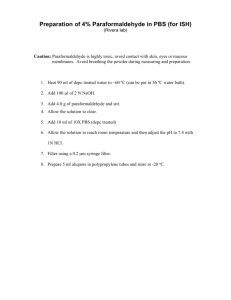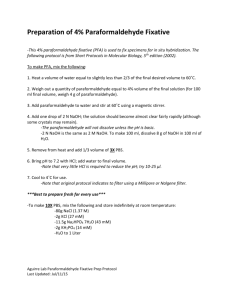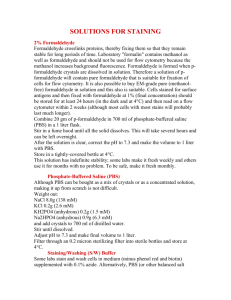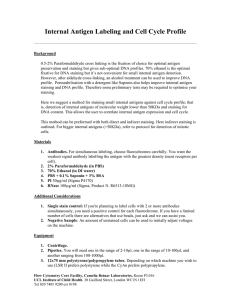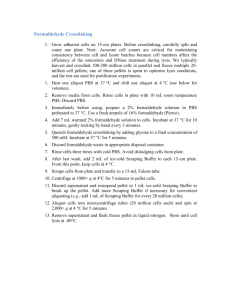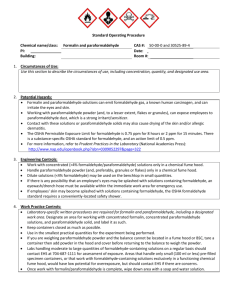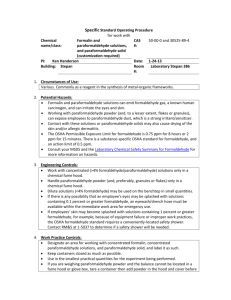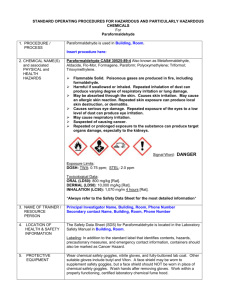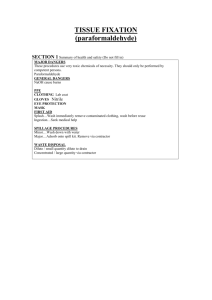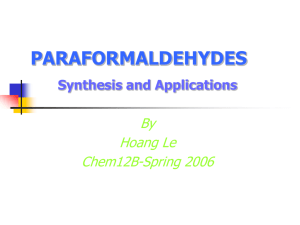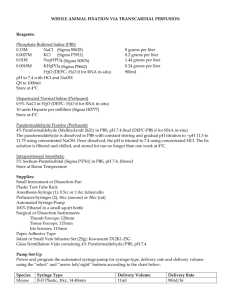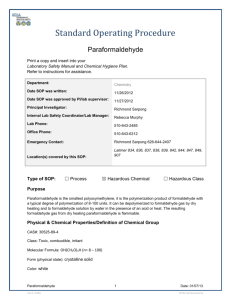Paraformaldehyde Fixation of Cells
advertisement
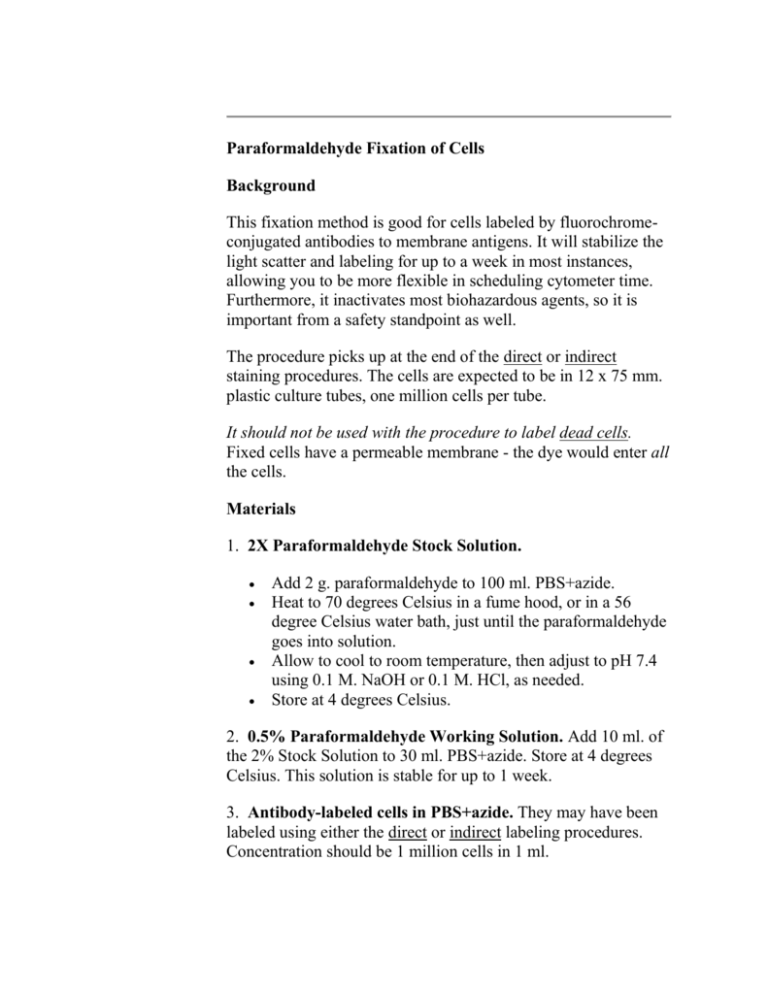
Paraformaldehyde Fixation of Cells Background This fixation method is good for cells labeled by fluorochromeconjugated antibodies to membrane antigens. It will stabilize the light scatter and labeling for up to a week in most instances, allowing you to be more flexible in scheduling cytometer time. Furthermore, it inactivates most biohazardous agents, so it is important from a safety standpoint as well. The procedure picks up at the end of the direct or indirect staining procedures. The cells are expected to be in 12 x 75 mm. plastic culture tubes, one million cells per tube. It should not be used with the procedure to label dead cells. Fixed cells have a permeable membrane - the dye would enter all the cells. Materials 1. 2X Paraformaldehyde Stock Solution. Add 2 g. paraformaldehyde to 100 ml. PBS+azide. Heat to 70 degrees Celsius in a fume hood, or in a 56 degree Celsius water bath, just until the paraformaldehyde goes into solution. Allow to cool to room temperature, then adjust to pH 7.4 using 0.1 M. NaOH or 0.1 M. HCl, as needed. Store at 4 degrees Celsius. 2. 0.5% Paraformaldehyde Working Solution. Add 10 ml. of the 2% Stock Solution to 30 ml. PBS+azide. Store at 4 degrees Celsius. This solution is stable for up to 1 week. 3. Antibody-labeled cells in PBS+azide. They may have been labeled using either the direct or indirect labeling procedures. Concentration should be 1 million cells in 1 ml. Equipment 1. pH meter. This is involved in making the 2. 3. 4. 5. 6. 7. paraformaldehyde stock solution. Balance with a resolution of at least 0.1 g. Again, this is to make the paraformaldehyde stock solution. One liter graduated cylinder or volumetric flask. Ditto. Centrifuge. You should know how the RPM translates into G-force. Pipette in the range of 500 to 1000 microliters (0.5-1.0 ml.). Vortex mixer. You could mix by tapping or shaking the tubes, but a mixer will give much more reproducible results in most cases. Refrigerator. To store the preserved cells. PREPARATION OF 2% FORMALDEHYDE STOCK SOLUTION (2 METHODS) METHOD 1: Formaldehyde preservative – 2% formaldehyde solution in protein-free phosphate-buffered saline (PBS). Prepare as follows: Add 2 g paraformaldehyde powder (e.g., Sigma, St. Louis, MO) to 100 ml of 1 X PBS. Heat to 70°C (do not exceed this temperature) in a fume hood until the paraformaldehyde goes into solution (note that this happens quickly as soon as the suspension reaches 70°C). Allow the solution to cool to room temperature. Adjust to pH 7.4 using 0.1 M NaOH or 0.1 M HCl, if needed. Filter and store at 4°C protected from light. METHOD 2: Formaldehyde preservative – 2% formaldehyde solution in protein-free PBS. Prepare as follows: 10% formaldehyde* 20 ml 10 x PBS 10 ml Distilled water 70 ml * 10% formaldehyde solution (e.g., Polysciences, Warrington, PA, ultrapure, Cat.#04018), depolymerized paraformaldehyde, EM grade, methanol-free solution. Ethanol-fixation of Samples for Long-term Storage and Subsequent DNA Staining I. Materials 70% Ethanol at – 20oC DNA Staining Buffer: Sodium citrate 0.25g II. Triton–x 100 0.75ml Propidium iodide 0.025g Ribonuclease A 0.005g Distilled water 250 ml Procedure 1. Place 1x106 cells from each sample into a polypropylene tube and centrifuge at 250 x g for 5 min. 2. Remove the supernatant as completely as possible without disturbing the pellet and add 1 ml of –20oC 70% EtOH dropwise to the cell pellet while vortexing. 3. Keep cells at -20oC until the day of DNA staining (cells can be stored for several weeks at -20oC). 4. On the day of DNA staining, take samples out of the freezer and spin them down by centrifugation at 250 x g for 5 min. Remove the supernatant as completely as possible without disturbing the cell pellet. 5. Add 1 ml of DNA staining buffer to the cell pellet and vortex gently and briefly. Keep cells for 15 min in the staining solution before acquisition on the flow cytometer. Commercial sources: Sodium citrate Cat# C7254 Sigma, St. Louis, MO Triton-x 100 Cat# x-100 " Ribonuclease A Cat# R4875 " Propidium iodide Cat# 537059 Calbiochem, San Diego, CA
